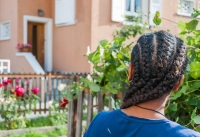
Exhibition "Unaccompanied Minors in Switzerland ? And then ..."

One exhibition , three dimensions: past, present and future
The " Unaccompanied Minors exhibition in Switzerland ? And then ... " gives voice to five young people living at the home for the unaccompanied minors RADOS in Sion. It highlights the reasons for their departure, their travel to Europe, how it is to live in Switzerland and what are their hopes and dreams for the future.
The exhibition aims to raise professionals and public’s awareness about the challenges and needs of these young people in order to ensure adequate care : support, training , life project, integration or socio-professional reintegration.
An itinerary exhibition in Switzerland
The exhibition runs in six French-speaking cantons from January to June 2014:
- January 6 to February 6, 2014 : Centre RLC, Sion
- February 7 to February 21, 2014 : Centre sociocultural Pôle Sud, Lausanne
- March 5 to March 20, 2014 : Maison de quartier de Plainpalais , Geneva
- March 24 to April 10, 2014 : Ecole professionnelle artisanale et industrielle , Fribourg
- May 5 to May 22, 2014 : Espace des Solidarités, Neuchâtel
- May 23 to June 13, 2014 : Delémont, venue to be defined
The exhibition is free and open to the public.
A commitment to separated children in Switzerland
The Swiss Foundation of the ISS is committed to creating a framework to allow unaccompanied children to grow up safely and develop prospects, either by returning to their country of origin if possible, or finding a sustainable solution in Switzerland or in a third country.